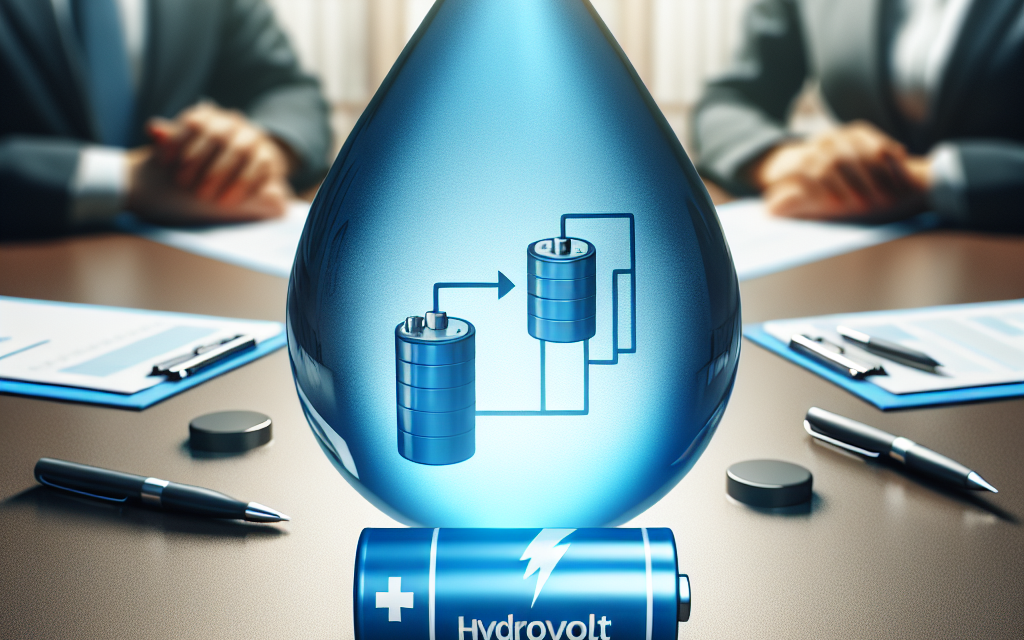“Hydro Completes Acquisition of Hydrovolt, Strengthening Sustainable Battery Recycling Leadership.”
Introduction
Hydro has successfully acquired the remaining stake in Hydrovolt from Northvolt, solidifying its position in the growing battery recycling market. This strategic move enhances Hydro’s commitment to sustainability and circular economy principles, enabling the company to leverage Hydrovolt’s innovative technology for recycling lithium-ion batteries. The acquisition not only strengthens Hydro’s portfolio but also aligns with global efforts to reduce waste and promote the responsible use of resources in the transition to renewable energy.
Hydro’s Strategic Move: Acquiring Full Control of Hydrovolt
In a significant strategic move, Hydro has successfully acquired the remaining stake in Hydrovolt from Northvolt, thereby gaining full control over the innovative joint venture. This acquisition marks a pivotal moment for Hydro as it seeks to enhance its position in the rapidly evolving battery recycling market. Hydrovolt, established in 2020, has been at the forefront of developing sustainable solutions for battery recycling, particularly in response to the growing demand for electric vehicles and renewable energy storage systems. By taking complete ownership of Hydrovolt, Hydro is not only solidifying its commitment to sustainability but also positioning itself to capitalize on the increasing need for efficient recycling processes.
The decision to acquire the remaining stake stems from Hydro’s long-term vision of creating a circular economy within the aluminum and energy sectors. As the world shifts towards greener technologies, the importance of recycling and reusing materials has never been more pronounced. Hydrovolt’s advanced recycling technology allows for the recovery of valuable materials from used batteries, which can then be reintegrated into the production cycle. This not only reduces waste but also minimizes the environmental impact associated with mining and processing raw materials. By fully integrating Hydrovolt into its operations, Hydro aims to streamline its recycling processes and enhance its overall sustainability efforts.
Moreover, this acquisition aligns with Hydro’s broader strategy to expand its portfolio in the renewable energy sector. As electric vehicles become increasingly prevalent, the demand for battery recycling solutions is expected to surge. By controlling Hydrovolt, Hydro can leverage its expertise in aluminum production and energy management to develop innovative recycling methods that meet the needs of the evolving market. This strategic alignment is crucial as it positions Hydro as a leader in the sustainable energy landscape, enabling the company to respond effectively to the challenges posed by battery waste and resource scarcity.
In addition to the environmental benefits, the acquisition is anticipated to yield significant economic advantages for Hydro. By owning Hydrovolt outright, the company can optimize its operations, reduce costs, and enhance profitability. The integration of Hydrovolt’s technology and expertise into Hydro’s existing framework is expected to lead to increased efficiency and productivity. Furthermore, as the demand for battery recycling services grows, Hydro is well-positioned to capture a larger share of this emerging market, thereby driving revenue growth and shareholder value.
As Hydro embarks on this new chapter with Hydrovolt, it is also important to consider the collaborative potential that this acquisition unlocks. The synergy between Hydro’s established capabilities in aluminum production and Hydrovolt’s innovative recycling technologies can foster new developments in sustainable practices. This collaboration may lead to the creation of new products and services that not only benefit the company but also contribute positively to the environment and society at large.
In conclusion, Hydro’s acquisition of the remaining stake in Hydrovolt represents a strategic and forward-thinking decision that underscores the company’s commitment to sustainability and innovation. By taking full control of Hydrovolt, Hydro is poised to enhance its recycling capabilities, capitalize on the growing demand for battery solutions, and reinforce its position as a leader in the renewable energy sector. This move not only reflects Hydro’s dedication to creating a circular economy but also sets the stage for future growth and success in an increasingly competitive landscape.
The Impact of Hydrovolt’s Acquisition on the Battery Recycling Industry
The recent acquisition of the remaining stake in Hydrovolt by Hydro marks a significant milestone in the battery recycling industry, particularly in the context of the growing demand for sustainable solutions in the face of increasing electric vehicle (EV) adoption. This strategic move not only consolidates Hydro’s position in the market but also enhances the operational capabilities of Hydrovolt, a company that has already made strides in the recycling of lithium-ion batteries. As the world shifts towards greener technologies, the implications of this acquisition extend beyond corporate interests, influencing environmental sustainability and resource management.
To begin with, the acquisition allows Hydrovolt to scale its operations, thereby increasing its capacity to recycle batteries efficiently. With the global battery market projected to expand rapidly, driven by the surge in electric vehicle production, the need for effective recycling solutions has never been more pressing. By integrating Hydrovolt’s advanced recycling technologies with Hydro’s extensive resources and expertise, the combined entity is poised to address the challenges associated with battery waste. This is particularly crucial, as improper disposal of batteries can lead to environmental hazards, including soil and water contamination.
Moreover, the acquisition signifies a commitment to circular economy principles, which emphasize the importance of reusing materials to minimize waste. Hydrovolt’s innovative processes enable the recovery of valuable metals such as lithium, cobalt, and nickel from spent batteries, which can then be reintegrated into the production cycle. This not only reduces the reliance on virgin materials but also mitigates the environmental impact associated with mining and extraction. As such, Hydro’s acquisition of Hydrovolt aligns with global sustainability goals, promoting a more responsible approach to resource utilization.
In addition to environmental benefits, the acquisition is likely to stimulate economic growth within the battery recycling sector. By enhancing Hydrovolt’s operational capabilities, the acquisition can lead to job creation and the development of new technologies. As the demand for battery recycling services increases, companies in this sector will need to expand their workforce and invest in research and development. This, in turn, can foster innovation, leading to more efficient recycling methods and the potential for new business opportunities.
Furthermore, the acquisition positions Hydro as a leader in the battery recycling landscape, which is becoming increasingly competitive. As more companies recognize the importance of sustainable practices, the market for battery recycling is expected to grow. Hydro’s strengthened presence through Hydrovolt can serve as a benchmark for best practices in the industry, encouraging other players to adopt similar approaches. This ripple effect can lead to a more robust and responsible battery recycling ecosystem, ultimately benefiting consumers and the environment alike.
In conclusion, Hydro’s acquisition of the remaining stake in Hydrovolt is a pivotal development in the battery recycling industry. By enhancing operational capabilities, promoting circular economy principles, and stimulating economic growth, this acquisition not only strengthens Hydro’s market position but also contributes to broader sustainability efforts. As the demand for electric vehicles continues to rise, the importance of effective battery recycling will only increase, making this acquisition a timely and strategic move. Ultimately, the impact of this acquisition will resonate throughout the industry, setting a precedent for future initiatives aimed at fostering a sustainable and responsible approach to battery management.
Northvolt’s Exit: What It Means for the Future of Hydrovolt
In a significant development within the battery recycling industry, Hydro has successfully acquired the remaining stake in Hydrovolt from Northvolt, marking a pivotal moment for both companies and the sector as a whole. This strategic move not only solidifies Hydro’s position in the market but also signals a transformative shift in the dynamics of battery recycling and sustainability efforts. As Northvolt exits its stake, it raises important questions about the future direction of Hydrovolt and the broader implications for the industry.
Northvolt, a prominent player in the European battery manufacturing landscape, has been instrumental in advancing sustainable battery solutions. However, its decision to divest from Hydrovolt indicates a strategic pivot towards focusing on its core competencies in battery production. This exit allows Northvolt to allocate resources and attention to its primary mission of developing high-performance batteries for electric vehicles and energy storage systems. Consequently, this shift may enhance Northvolt’s ability to innovate and expand its market share in the rapidly growing battery sector.
On the other hand, Hydro’s acquisition of the remaining stake in Hydrovolt underscores its commitment to becoming a leader in the circular economy, particularly in the realm of battery recycling. By fully owning Hydrovolt, Hydro can streamline operations, enhance efficiency, and leverage its extensive expertise in aluminum production and recycling. This integration is expected to foster innovation in recycling technologies, enabling Hydrovolt to improve its processes and increase the recovery rates of valuable materials from spent batteries. As the demand for electric vehicles continues to surge, the need for effective recycling solutions becomes increasingly critical, positioning Hydrovolt as a key player in addressing this challenge.
Moreover, Hydro’s full ownership of Hydrovolt aligns with the growing emphasis on sustainability and environmental responsibility within the industry. As governments and consumers alike prioritize eco-friendly practices, the ability to recycle batteries efficiently will be paramount. Hydrovolt’s operations will not only contribute to reducing waste but also support the supply chain for raw materials essential for battery production. This closed-loop system is vital for minimizing the environmental impact of battery manufacturing and ensuring a sustainable future for electric mobility.
In addition to operational efficiencies and sustainability benefits, Hydro’s acquisition may also lead to enhanced collaboration opportunities within the industry. With Hydrovolt now fully under Hydro’s umbrella, there is potential for partnerships with other stakeholders in the battery ecosystem, including automotive manufacturers, technology firms, and research institutions. Such collaborations could drive innovation and accelerate the development of advanced recycling technologies, ultimately benefiting the entire sector.
Furthermore, this acquisition may influence market dynamics, as Hydrovolt’s enhanced capabilities could position it as a preferred partner for companies seeking reliable recycling solutions. As the industry grapples with the challenges of battery waste management, Hydrovolt’s expertise and resources could attract new clients and foster long-term relationships, thereby solidifying its market presence.
In conclusion, Northvolt’s exit from Hydrovolt represents a significant turning point for both companies and the battery recycling industry. Hydro’s acquisition not only strengthens its commitment to sustainability but also opens new avenues for innovation and collaboration. As the demand for electric vehicles continues to rise, the importance of effective battery recycling will only grow, making Hydrovolt a crucial player in shaping a sustainable future. The implications of this acquisition extend beyond corporate strategy; they resonate throughout the industry, highlighting the critical need for responsible resource management in the face of evolving technological landscapes.
Hydro’s Vision for Sustainable Energy Through Hydrovolt
Hydro’s recent acquisition of the remaining stake in Hydrovolt from Northvolt marks a significant milestone in the company’s commitment to sustainable energy solutions. This strategic move not only reinforces Hydro’s position in the growing market for battery recycling but also aligns with its broader vision of promoting a circular economy. By taking full ownership of Hydrovolt, Hydro aims to enhance its capabilities in recycling lithium-ion batteries, which are essential for the transition to renewable energy sources and electric mobility.
The partnership between Hydro and Northvolt has already demonstrated the potential for innovation in battery recycling. Hydrovolt, established as a joint venture, has been at the forefront of developing efficient processes for recovering valuable materials from used batteries. This initiative is particularly crucial as the demand for electric vehicles continues to rise, leading to an increase in battery waste. By acquiring the remaining stake, Hydro is poised to accelerate the development of advanced recycling technologies that can recover up to 95% of the materials in lithium-ion batteries, including lithium, cobalt, and nickel. This not only reduces the environmental impact associated with mining these materials but also ensures a sustainable supply chain for the burgeoning electric vehicle market.
Moreover, Hydro’s vision extends beyond just recycling; it encompasses a holistic approach to sustainability. The company recognizes that the future of energy lies in integrating renewable sources with efficient recycling processes. By investing in Hydrovolt, Hydro is not only addressing the immediate challenges posed by battery waste but is also contributing to the long-term sustainability of the energy sector. The recovered materials can be reintegrated into the production of new batteries, thereby closing the loop and minimizing waste. This circular economy model is essential for reducing the carbon footprint associated with battery production and disposal.
In addition to environmental benefits, Hydro’s acquisition of Hydrovolt is expected to create economic opportunities. The establishment of advanced recycling facilities will generate jobs and stimulate local economies, particularly in regions where battery production and electric vehicle manufacturing are concentrated. As Hydrovolt expands its operations, it will also foster innovation and research in battery technology, further solidifying Hydro’s role as a leader in sustainable energy solutions.
Furthermore, Hydro’s commitment to sustainability is reflected in its broader corporate strategy, which emphasizes reducing greenhouse gas emissions and promoting responsible resource management. By integrating Hydrovolt into its operations, Hydro is taking a proactive stance in addressing the challenges posed by climate change. The company’s efforts to promote sustainable practices resonate with global initiatives aimed at achieving net-zero emissions and transitioning to a low-carbon economy.
In conclusion, Hydro’s acquisition of the remaining stake in Hydrovolt from Northvolt is a pivotal step in its journey toward a sustainable energy future. This strategic decision not only enhances Hydro’s capabilities in battery recycling but also aligns with its vision of fostering a circular economy. By prioritizing the recovery of valuable materials and reducing waste, Hydro is not only addressing the pressing challenges of battery disposal but is also paving the way for a more sustainable and resilient energy landscape. As the world increasingly shifts toward renewable energy and electric mobility, Hydro’s commitment to innovation and sustainability will undoubtedly play a crucial role in shaping the future of the energy sector.
Analyzing the Financial Implications of Hydro’s Acquisition
The recent acquisition of the remaining stake in Hydrovolt by Hydro marks a significant strategic move in the evolving landscape of sustainable energy and recycling. This transaction not only consolidates Hydro’s position in the market but also has profound financial implications that merit careful analysis. By acquiring the remaining shares from Northvolt, Hydro is poised to enhance its operational capabilities and expand its influence in the burgeoning battery recycling sector, which is increasingly critical as the world shifts towards electrification and renewable energy sources.
To begin with, the financial ramifications of this acquisition can be viewed through the lens of investment in innovation and sustainability. Hydrovolt, a joint venture focused on recycling lithium-ion batteries, aligns perfectly with Hydro’s commitment to sustainable practices. By fully owning Hydrovolt, Hydro can streamline operations, reduce costs associated with shared management, and ultimately increase profitability. This consolidation allows for a more focused investment in research and development, which is essential for staying competitive in a rapidly evolving market. The ability to innovate in battery recycling processes could lead to significant cost savings and improved margins, thereby enhancing overall financial performance.
Moreover, the acquisition is likely to bolster Hydro’s revenue streams. As the demand for electric vehicles (EVs) continues to rise, so too does the need for efficient recycling solutions for used batteries. By controlling Hydrovolt, Hydro can capitalize on this growing market, positioning itself as a leader in battery recycling. This strategic positioning not only opens up new revenue opportunities but also mitigates risks associated with fluctuating raw material prices. By recycling batteries, Hydro can secure a more stable supply of critical materials, which is particularly important given the volatility in the global supply chain for metals like lithium and cobalt.
In addition to revenue generation, the acquisition has implications for Hydro’s balance sheet. The integration of Hydrovolt’s assets and capabilities can lead to improved operational efficiencies, which may result in lower overhead costs. This reduction in expenses can enhance profit margins, thereby positively impacting net income. Furthermore, the acquisition may also improve Hydro’s cash flow situation, as the company can reinvest savings from operational efficiencies into further growth initiatives or shareholder returns. This financial flexibility is crucial for maintaining a competitive edge in the industry.
However, it is essential to consider the potential risks associated with this acquisition. The integration process can be complex and may require significant upfront investment. There is also the challenge of aligning corporate cultures and operational practices between Hydro and Hydrovolt. If not managed effectively, these factors could lead to disruptions that might offset the anticipated financial benefits. Therefore, careful planning and execution will be critical to ensure that the acquisition delivers the desired outcomes.
In conclusion, Hydro’s acquisition of the remaining stake in Hydrovolt from Northvolt represents a pivotal moment for the company, with far-reaching financial implications. By fully integrating Hydrovolt into its operations, Hydro stands to enhance its market position, drive innovation, and improve profitability. While there are inherent risks in such a strategic move, the potential rewards in terms of revenue growth, operational efficiency, and long-term sustainability are substantial. As the global economy increasingly prioritizes sustainable practices, Hydro’s proactive approach in this acquisition could serve as a model for other companies looking to navigate the complexities of the energy transition.
The Role of Hydrovolt in Norway’s Green Transition
Hydrovolt, a pioneering joint venture between Hydro and Northvolt, plays a crucial role in Norway’s green transition, particularly in the realm of sustainable battery recycling. As the world increasingly shifts towards renewable energy sources and electric vehicles, the demand for efficient recycling solutions has never been more pressing. Hydrovolt’s establishment in 2021 marked a significant step forward in addressing the environmental challenges posed by battery waste, particularly lithium-ion batteries, which are essential for electric vehicles and energy storage systems. By acquiring the remaining stake in Hydrovolt from Northvolt, Hydro is reinforcing its commitment to sustainability and enhancing its capacity to contribute to a circular economy.
The importance of Hydrovolt in Norway’s green transition cannot be overstated. As the country aims to reduce its carbon footprint and achieve ambitious climate goals, the recycling of batteries becomes a vital component of this strategy. Hydrovolt’s facility in Fredrikstad is designed to process up to 12,000 tons of batteries annually, which translates to approximately 25,000 electric vehicle batteries. This capacity not only alleviates the pressure on landfills but also ensures that valuable materials such as lithium, cobalt, and nickel are recovered and reintroduced into the supply chain. By doing so, Hydrovolt is not only minimizing waste but also reducing the need for new raw materials, which often involve environmentally damaging extraction processes.
Moreover, Hydrovolt’s operations align seamlessly with Norway’s broader environmental policies and initiatives. The Norwegian government has set ambitious targets for electric vehicle adoption, aiming for all new cars sold to be zero-emission by 2025. This transition necessitates a robust infrastructure for battery recycling, as the number of electric vehicles on the road continues to rise. Hydrovolt’s facility is strategically positioned to support this growing market, ensuring that the lifecycle of batteries is managed responsibly and sustainably. In this context, Hydrovolt serves as a model for other countries looking to enhance their recycling capabilities and promote a circular economy.
In addition to its environmental benefits, Hydrovolt also contributes to the local economy by creating jobs and fostering innovation. The facility employs skilled workers and collaborates with research institutions to develop advanced recycling technologies. This focus on innovation not only enhances the efficiency of the recycling process but also positions Norway as a leader in sustainable battery management. As the global demand for electric vehicles and renewable energy solutions continues to rise, Hydrovolt’s expertise and technological advancements will be instrumental in shaping the future of battery recycling.
Furthermore, Hydrovolt’s commitment to sustainability extends beyond its operational practices. The company actively engages with stakeholders, including local communities, to raise awareness about the importance of battery recycling and the role it plays in achieving climate goals. By fostering a culture of sustainability, Hydrovolt is not only contributing to Norway’s green transition but also inspiring other industries to adopt similar practices.
In conclusion, Hydrovolt’s acquisition of the remaining stake from Northvolt signifies a pivotal moment in Norway’s journey towards a sustainable future. By enhancing its capacity for battery recycling, Hydrovolt is addressing the environmental challenges associated with the growing demand for electric vehicles while simultaneously supporting the local economy and promoting innovation. As Norway continues to lead the way in green initiatives, Hydrovolt stands as a testament to the potential of collaborative efforts in achieving a circular economy and a more sustainable world.
Future Innovations Expected from Hydrovolt Post-Acquisition
In a significant move that underscores its commitment to sustainable practices and innovation, Hydro has acquired the remaining stake in Hydrovolt from Northvolt. This acquisition not only solidifies Hydro’s position in the battery recycling sector but also paves the way for future innovations that are expected to emerge from Hydrovolt. As the demand for electric vehicles and renewable energy solutions continues to rise, the need for efficient battery recycling processes becomes increasingly critical. Hydrovolt, a joint venture initially established to address this need, is now poised to leverage Hydro’s extensive resources and expertise to enhance its operations and expand its technological capabilities.
One of the most promising areas for innovation lies in the development of advanced recycling technologies. Hydrovolt has already made strides in creating a state-of-the-art facility that can process end-of-life batteries, recovering valuable materials such as lithium, cobalt, and nickel. With Hydro’s backing, the company is expected to invest further in research and development, aiming to refine these processes and increase recovery rates. This focus on technological advancement will not only improve the efficiency of battery recycling but also contribute to a more circular economy, where materials are reused rather than discarded.
Moreover, the acquisition opens up opportunities for Hydrovolt to collaborate with other industry leaders and research institutions. By fostering partnerships, Hydrovolt can tap into a wealth of knowledge and expertise, driving innovation in battery recycling and related fields. Such collaborations could lead to the development of new methods for battery disassembly, material separation, and even the creation of new battery chemistries that are easier to recycle. As the industry evolves, these innovations will be crucial in meeting regulatory requirements and addressing environmental concerns associated with battery disposal.
In addition to technological advancements, Hydrovolt is likely to explore new business models that align with the growing emphasis on sustainability. The shift towards a circular economy necessitates a reevaluation of traditional practices, and Hydrovolt is well-positioned to lead this change. By offering services that extend beyond recycling, such as battery refurbishment and second-life applications, Hydrovolt can create additional value for its customers while promoting sustainable practices. This holistic approach not only enhances the company’s competitive edge but also contributes to a more sustainable future.
Furthermore, the acquisition is expected to enhance Hydrovolt’s ability to scale its operations. With Hydro’s financial strength and operational expertise, Hydrovolt can expand its facilities and increase its processing capacity. This scalability is essential in meeting the anticipated surge in battery waste as electric vehicle adoption accelerates. By positioning itself as a leader in battery recycling, Hydrovolt can play a pivotal role in ensuring that the materials needed for new batteries are sourced sustainably, thereby reducing the environmental impact of battery production.
In conclusion, Hydro’s acquisition of the remaining stake in Hydrovolt marks a significant milestone in the battery recycling industry. The future innovations expected from Hydrovolt post-acquisition are poised to transform the landscape of battery recycling, driven by advancements in technology, strategic collaborations, and sustainable business practices. As the world moves towards a more sustainable energy future, Hydrovolt’s role in this transition will be crucial, ensuring that valuable materials are recovered and reused, thereby contributing to a more sustainable and circular economy. The synergy between Hydro and Hydrovolt is set to yield significant benefits, not only for the companies involved but also for the environment and society at large.
Q&A
1. **What is Hydrovolt?**
Hydrovolt is a joint venture focused on recycling electric vehicle batteries, established by Hydro and Northvolt.
2. **What recent development occurred regarding Hydrovolt?**
Hydro has acquired the remaining stake in Hydrovolt from Northvolt.
3. **Why did Hydro acquire the remaining stake in Hydrovolt?**
The acquisition aims to strengthen Hydro’s position in the battery recycling market and enhance its sustainability efforts.
4. **What is the significance of this acquisition?**
It allows Hydro to fully control Hydrovolt’s operations and expand its capabilities in battery recycling.
5. **How does this acquisition align with Hydro’s business strategy?**
It aligns with Hydro’s commitment to sustainability and the circular economy, particularly in the growing electric vehicle sector.
6. **What impact does this have on Northvolt?**
Northvolt will no longer have a stake in Hydrovolt, allowing it to focus on its core battery manufacturing business.
7. **What are the future plans for Hydrovolt post-acquisition?**
Hydrovolt plans to scale up its operations and increase its capacity for recycling EV batteries to meet rising demand.
Conclusion
Hydro’s acquisition of the remaining stake in Hydrovolt from Northvolt marks a significant step in strengthening its position in the battery recycling sector. This move not only enhances Hydro’s commitment to sustainability and circular economy practices but also consolidates its expertise in aluminum and energy solutions. The partnership aims to boost the development of efficient recycling processes for electric vehicle batteries, aligning with global efforts to reduce environmental impact and support the transition to renewable energy sources. Overall, this acquisition positions Hydro as a key player in the growing market for battery recycling, contributing to a more sustainable future.





